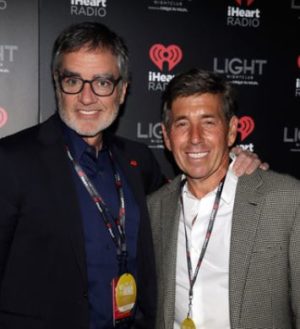
iHeart executives have not said much publicly since announcing a “technology transformation and new organizational structure” last month that also included hundreds of programming layoffs. On the iHeartMedia Q4 earnings call Thursday night, CEO Bob Pittman detailed exactly how the company plans to implement its strategy.
Pittman said modernizng the company is one of the most important initiatives that iHeart has undertaken. “We are modernizing iHeart to take advantage of the significant investments we’ve made in new technologies to build a modern infrastructure that provides better quality, newer products, and delivers new cost efficiencies. This modernization is essential to being a major player in today’s digital-focused media world. It sets us apart from the traditional media players. And it builds upon the strong momentum of our 2019 and adds to our competitiveness, our effectiveness, and our efficiency with our major constituencies. To be clear, this represents an important element to building shareholder value as well as overall competitiveness of our company today and in the future.”
Pittman went on to say that Artificial Intelligence will play a key role in transforming the company. “Our decision to invest in modernization is, at its core, a reimagining of what a true multi-platform media company looks like today, including using technology and AI to improve the quality of the decisions we make and the experience we provide for our consumers, enabling us to be better and more robust partners for our advertisers, and providing unique resources to help our employees be as efficient and as effective as possible — helping them reach their full potential. We believe this is essential to our future. Importantly, our investments in modernization are expected to deliver meaningful cost savings of approximately $100 million on a run-rate basis by the second half of 2021.
“Some of the key operational changes that are being made as part of these initiatives will be: a new organizational structure for our markets group that maximizes the performance for each of our markets using our one-of-a-kind scale of multiple platforms; our leadership in audio and technology; and, our expertise and extensive experience in data and artificial intelligence. We’ve also created centers of excellence which will consolidate functional areas of expertise in specific locations to deliver the best possible products and services for the entire company, assuring consistent and high quality across every single market in which we operate. These centers of excellence were made possible by the half-billion-dollar investment we made in technology and building out our core infrastructure. And it allows us to provide services from anywhere in the company for the benefit of anywhere else in the company — meaning distance is no longer a barrier.”
Pittman said reallocating capital toward modernization is a prudent decision that will enable the creation of new products and services, improve the experience of iHeart employees, increase margins, drive growth, and create value for shareholders.
Later on in the call during Q&A from analysts Pittman said this modernization plan is long overdue and needs to be done to be able to compete in today’s marketplace. “We’re modernizing a company that did business another way — because it’s been around so long — to catch up to the way business is done today. It’s how our employees work, and behind it is pretty simple, rote tasks that are better done by machines — it’s easier. It frees our people up to do what they do best, which is thinking, analysis, contact with other people, and it provides great efficiency. it allows us to move faster, and to be more responsive. It also allows us to make better decisions. An example is that we have about 3,500 data points of information each week on music selection. There’s no human brain that can absorb all of that, but artificial intelligence can. We’re beginning to use more AI to make decisions. It frees those people up that are doing a lot of rote work, to do the other side of their job in programming, which is to make our stations as creative as they can be, tie into the community more, promotions, imaging, etc. We’re taking the company into the future and we’re playing catch-up on that.”
CFO Richard Bressler added that these were very hard decisions and “we were very thoughtful about it.”
In the Q&A session an analyst asked if there was a risk of diluting local brands from the cost cutting. Pittman said the quality of the programming goes up, not down. He used the example of Ryan Seacrest doing his morning show in L.A. from New York four days a week after he gets off the air on TV. “He gets great ratings. We want to put the best programming we can into the marketplace. We’ve looked very carefully at our stations and where we have leadership positions and iconic personalities, we’ve not made changes there, that’s working fine. Where we think we can get better quality or we could get more leverage out of great talent we have, we’ve tried to find those opportunities.”
Pittman said, due to technology, location is no longer an issue and the company is able to project the best talent they have to any location. “We think that’s a substantial advantage for us. We did not just start this. It’s been going on for awhile.”









As one of the original GM’s that formed the Clear Channel “Family”, this makes me want to puke. The early days of Clear Channel allowed local broadcasters to run their markets as they wished. It was clear that they better make a sack of money, but stations could play polka music if it was local, had good ratings and produced cash. Good ratings meant local stations paid attention to what their market wanted. News was still a major part of the equation, and personalities were at the forefront. Not anymore. The industrialization of radio is upon us, and it’s not good.
“Modernization.” Pretty pathetic code for “robot radio” and “to hell with the employees.” Pittman is clearly a lowlife who is interested in Pittman. Period. He belongs in the same boat as Limbaugh, who, after being ridiculously honored with the Medal of Freedom and whose “politics” were defended by this publication, just recently claimed “‘Mr. Man’ Trump Will ‘Have Fun’ with ‘Gay Guy’ Buttigieg kissing his husband.” I guess Radio Ink just thinks Pittman is a swell guy and gay slurs are just politics. A publication in spiral like the industry it covers.
A kinder, gentler I Heart — So instead of kicking jocks out the door, now they just show them the door…
Why not fire some of their lazy ass overpaid managers that do nothing all day.
Right on!
Pittman says Seacrest “gets great ratings”… has he looked at the ratings. Since Seacrest has voice-tracked his LA KIIS Radio show out of New York, KIIS has been in an alarming and consistent downward ratings trend.
Of course that has more to do with his TV appearances, not iHeart. Meanwhile iHeart has three of the Top 5 stations in LA, and one of them is KIIS.
I’ll give you credit , Bob, for extracting a lot more cash from I Heart for yourself than your previous schemes at AOL and Century 21.
Steve Green you hit the nail on the head? Typical Corporate Radio Speak from the Suits! Moving forward on taking the”Local” from Local Radio.
Ed – YOU hit the nail on the head!
blah blah blah